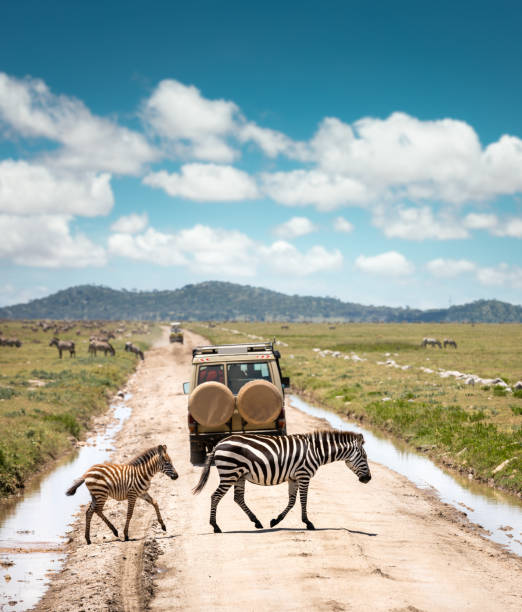For travelers planning a Tanzania safari, a common question is:
“How far is Serengeti from Kilimanjaro Airport?”
Kilimanjaro International Airport (JRO) is the main gateway for international travelers arriving to Northern Tanzania. Understanding the distance, travel options, and logistics will help you plan your Serengeti safari efficiently.
In this guide, we’ll cover:
Distance and travel time from Kilimanjaro Airport to Serengeti
Travel options: road, flight, and combination trips
Best routes depending on your safari location
Cost breakdowns and tips
Insider advice for first-time travelers

Location: Near Arusha, Tanzania, about 40 km from Arusha city center
Function: International flights from Europe, North America, Africa, and Asia
Role for Safari Travelers: Acts as a gateway to Northern Safari Circuit, including:
Serengeti National Park
Ngorongoro Crater
Tarangire and Lake Manyara National Parks
Pro Tip: Most safari operators organize transfers directly from JRO to lodges or airstrips, making your journey hassle-free.
The distance varies depending on your entry point into Serengeti:
| Route / Airstrip | Distance from JRO (km) | Approx. Travel Time |
|---|---|---|
| Arusha → Seronera (Central Serengeti) | 330 km (by road) | 8–10 hours by 4x4 safari vehicle |
| Arusha → Northern Serengeti (Lamai/Kogatende) | 400–450 km | 10–12 hours by 4x4 vehicle |
| Kilimanjaro → Serengeti (Fly-in via Seronera) | 250 km (direct flight) | 1–1.5 hours flight |
| Kilimanjaro → Serengeti (Fly-in via Kogatende/Ndutu) | 280–350 km | 1–1.5 hours flight |
Key Insight: Driving from Kilimanjaro to Serengeti is long and bumpy, while flying saves several hours and provides a scenic aerial view of the Tanzanian plains.
Route: Kilimanjaro → Arusha → Moshi → Tarangire / Ngorongoro → Serengeti
Duration: 8–12 hours depending on location, road conditions, and stops
Pros: Scenic route, stops at Ngorongoro or Tarangire, budget-friendly
Cons: Long drive, rough roads, may be tiring after international flights
Tip: Best for travelers wanting a full overland safari experience including Ngorongoro Highlands.
Operators: Coastal Aviation, Auric Air, Safari Air Link, Precision Air
Airstrips: Seronera (central), Kogatende (north), Ndutu (south)
Duration: 1–1.5 hours flight
Pros: Fast, convenient, scenic aerial view
Cons: Slightly higher cost, limited luggage allowance
Frequency: Multiple flights daily, coordinated with safari lodges
Pro Tip: Many lodges offer fly-in packages, including pickup from the airstrip to the lodge.
Example: Fly from Kilimanjaro → Seronera, then short game drive transfer to lodge
Benefit: Maximizes comfort and reduces long road time
Cost: Moderate — less expensive than full charter, faster than full road trip
| Safari Region | Recommended Route | Reason |
|---|---|---|
| Central Serengeti (Seronera) | Fly-in from Kilimanjaro | Fastest access to central wildlife areas |
| Northern Serengeti (Lamai/Kogatende) | Fly-in to Kogatende | Ideal for Mara River crossings and migration viewing |
| Southern Serengeti (Ndutu) | Fly-in to Ndutu or drive via Ngorongoro | Best for wildebeest calving season |
| Full Northern Circuit (Ngorongoro + Serengeti) | Drive via Arusha, optional fly-in for Northern Serengeti | Combines safari variety with convenience |
Insider Tip: Your choice of route depends on time, budget, and season. Fly-in is highly recommended for short trips or during rainy season when roads can be difficult.
Private 4x4 safari transfer: $250–$400 one-way
Shared safari vehicle: $100–$150 per person (depends on group size)
Fuel & park fees: Included if booked via tour operator
Domestic flight: $150–$300 per person one-way
Charter flights: $500–$1,200 per aircraft (ideal for private groups)
Transfer from airstrip to lodge: $30–$100
Pro Tip: Booking a fly-in safari package often bundles flights, transfers, and game drives, saving time and reducing hassle.
Morning Flights: Most flights depart in the morning to avoid afternoon turbulence and allow same-day safari start.
Luggage Limits: Domestic flights have 15–20 kg luggage limits; check in advance if carrying photography equipment.
Road Travel: Bring snacks, water, and a camera for scenic stops along the way.
Combined Transfers: Many lodges coordinate transfers from Kilimanjaro to Serengeti, minimizing waiting times.
Peak Season Planning: June–October flights and road transfers fill quickly; book at least 3–6 months in advance.
Day 1: Arrive at Kilimanjaro Airport → Fly to Serengeti (Seronera) → Afternoon game drive
Day 2–3: Full-day Serengeti game drives
Day 4: Optional hot air balloon safari → Drive/fly to Ngorongoro
Day 5: Ngorongoro Crater safari → Return to Kilimanjaro
Day 1: Arrive Kilimanjaro Airport → Drive to Tarangire National Park
Day 2: Full-day Tarangire safari → Drive to Ngorongoro
Day 3: Ngorongoro Crater safari
Day 4–6: Serengeti game drives (Central & Northern regions)
Day 7: Return to Kilimanjaro Airport
Tip: Fly-in is recommended for travelers short on time, while overland is great for those wanting a full safari circuit experience.
Approximately 8–12 hours depending on the region and road conditions.
Yes — flying saves time, is more comfortable, and allows you to start your safari immediately.
Only via flight; road travel takes almost a full day.
Yes — usually 15–20 kg per person, plus small carry-on items. Check with airlines.
Yes — drives pass Arusha, Ngorongoro Highlands, and Tarangire, offering mountain and savannah views.
The distance from Kilimanjaro Airport to Serengeti is significant, but Tanzania offers flexible travel options:
Fly-in safari: 1–1.5 hours, ideal for short trips, comfort, and efficiency
Overland safari: 8–12 hours, best for a scenic multi-park adventure
Pro Tip: For most travelers, a fly-in to Serengeti combined with a short transfer to your lodge provides the best balance of comfort, speed, and safari experience.
With proper planning, you can maximize your wildlife sightings, enjoy the landscapes, and start your safari adventure immediately after arriving at Kilimanjaro Airport.